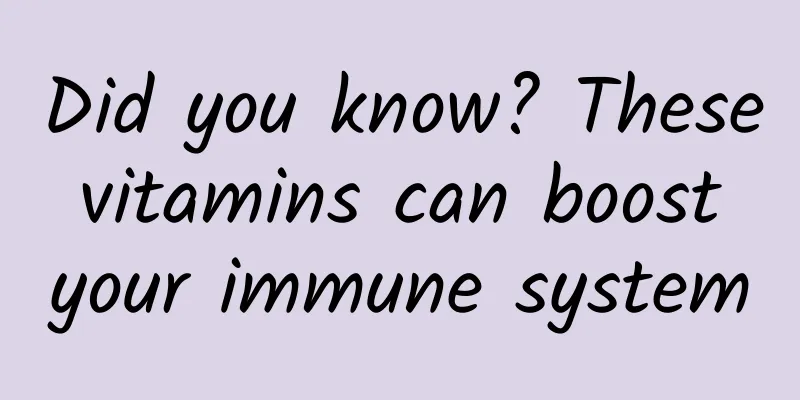Did you know? These vitamins can boost your immune system

|
Knowing which vitamins can boost the immune system is very important for our bodies. After all, our world is not sterile. Every day, we are exposed to countless harmful microorganisms that are constantly evolving to better infect us. Image source: Pixabay Knowing the risks, we often do everything we can to protect ourselves from getting sick. We might throw on a jacket, drink some hot tea, and head to the pharmacy for reinforcements. But do we know which vitamins can boost the immune system? Is it even possible to fight the cold with certain nutrients, or is it just a marketing gimmick? It’s hard to underestimate the role nutrition plays in maintaining our health. Research shows that a diet composed primarily of whole foods and providing adequate amounts of high-quality protein is key to longevity and a better quality of life. However, our immune system is arguably the most complex part of the human body besides our brain, and it may require more specific nutrients to keep it functioning at its best. Here we take a closer look at whether vitamins can really boost your immune system and which nutrients are important for us to maintain a healthy body. 01Can vitamins boost your immune system? Your immune system works tirelessly to fight off any harmful bacteria and viruses you come into contact with. It is one of the most complex and interconnected systems in the human body, and there are many different factors that influence your immune response. These include your genetic makeup, age, health, and stress levels. Diet is one of the biggest contributors to a healthy immune system, and growing evidence suggests that the modern Western diet — high in sugar, salt and fat — may be to blame for the dramatic rise in chronic disease around the world. Your body needs a range of different nutrients to boost your defenses and keep disease at bay. But while certain nutrients do a great job of supporting your immune system, it's not as easy as taking a multivitamin pill every morning. If you really want to boost your immunity, you may need to make lasting and far-reaching changes to your eating habits. Still, addressing vitamin and mineral deficiencies may be a good start. Micronutrients boost the body's natural defenses by strengthening the body's physical barriers (such as the skin or mucous membranes), increasing antibody production, and improving "communication" between cells. Some vitamins tend to support your immune system better than others. 0 2 Ideal vitamins to boost your immune system Vitamin C Vitamin C, or ascorbic acid as it's commonly known, is a common ingredient in many over-the-counter cold and flu remedies. Vitamin C deficiency has long been associated with poor immune function and increased susceptibility to infection. Research also shows that when your body is fighting an infection, supplementing with vitamin C can help you recover faster, even if you’re already taking the recommended 75–90 mg of ascorbic acid per day. Image source: Pixabay Vitamin C supports the immune system on multiple levels. Among other functions, it strengthens white blood cells, maintains a strong skin barrier, and protects against oxidative stress. Many people believe that citrus fruits are highest in ascorbic acid. They are not wrong - a medium-sized orange contains nearly 70 mg of vitamin C. However, certain vegetables can also be good sources. For example, one bell pepper contains nearly 65 mg, while 100 grams of broccoli provides more than 89 mg. B vitamins B vitamins are essential for the existence of all life forms on our planet, from bacteria to humans. There are eight different types of B vitamins, each responsible for a wide range of metabolic and regulatory processes. Simply put, without B vitamins, we would not be able to move, think, or build and repair any tissue in our bodies. There is also a lot of evidence that these nutrients play an important role in boosting our immune systems. Folate (B9) and B12 deficiencies can affect the production and activity of white blood cells, which can drastically alter immune responses. They can also lead to a condition called hyperhomocysteinemia, which increases systemic inflammation and triggers a host of other illnesses. A 2017 study also found that reduced levels of B6 can negatively impact our immune systems. Thankfully, you can get B vitamins from most whole foods. As long as you stick to a healthy diet rich in whole grains, meats, eggs, legumes, seeds, nuts, fruits, and dark leafy vegetables, you should easily reach the recommended daily intake. Vitamin D Before the introduction of antibiotics, vitamin D was unknowingly used to treat tuberculosis, with cod liver oil and sun exposure used to treat tuberculosis - both treatments are rich in vitamin D. Vitamin D deficiency has been linked to an increased risk of developing a number of autoimmune diseases, including psoriasis, multiple sclerosis, and rheumatoid arthritis. What’s more, this micronutrient helps activate and proliferate white blood cells, boosting our defenses against a variety of illnesses. Red meat, liver, egg yolks and oily fish, such as salmon, sardines and mackerel, tend to contain the highest amounts of vitamin D. If you don't like animal foods, don't worry. Many countries add vitamin D to foods such as breakfast cereals, plant-based milks or mushrooms to prevent vitamin D deficiency in the general population. Zinc Although not technically a vitamin, zinc is one of the most important nutrients for our health. It is essential for our growth, development, and the functioning of our nervous and reproductive systems. Without zinc, our immune system would also suffer. Research shows that zinc has a direct effect on the production and function of white blood cells. It can also act as an immunostimulant - an ingredient that increases the effectiveness of the immune system's response. In addition, many studies have shown that zinc may play an anti-cancer role, primarily by protecting and repairing DNA strands. You can find zinc in many common staple foods, such as whole grains, dairy products, meats, lentils or nuts. Many foods, especially breakfast cereals, are also often fortified with this nutrient. 0 3How to incorporate vitamins into your daily diet While vitamin supplements sound like an easy fix, the best way to ensure you're getting enough essential nutrients is to eat a healthy and balanced diet. Your body tends to absorb and utilize vitamins better from food, while supplements can vary in quality. However, eating a balanced diet may not always be possible, and even if you eat a healthy diet, you may still be lacking in nutrients. In this case, vitamin supplements can come in handy. While nutrition certainly plays an important role in building a strong immune system, you may also need to address other aspects of your lifestyle if you want to maximize your chances of avoiding infection. Rather than thinking about boosting your immune system, think about keeping it healthy and balanced. Ideally, this balance will be achieved through nutrition and lifestyle interventions. Not only do you need to eat and drink well, but there are other important aspects of your health that need to be addressed to keep it balanced. Sleep well, digest well, reduce chronic stress, stay connected with friends and watch your diet. Source: Chongqing Tianji Network Co., Ltd. Source: Live Science "Which vitamins boost the immune system?" Statement: Except for original content and special notes, some pictures are from the Internet. They are not for commercial purposes and are only used as popular science materials. The copyright belongs to the original authors. If there is any infringement, please contact us to delete them. |
>>: Can oral vitamin E whiten skin?
Recommend
Can pregnant women eat refrigerated fruits?
In daily life, refrigerators are a necessity for ...
How much progesterone indicates that menstruation is coming
Progesterone is a hormone in the female body and ...
There are so many types of myopia glasses. Which one is suitable for your child?
Nowadays, there are many myopia glasses available...
What are the treatments for labia majora hypertrophy?
The labia come in different sizes and are part of...
Is there any trace after a person has passed away?
Abortion is very harmful to women's uterus, a...
What are the yoga poses for postpartum recovery?
In today's fast-paced city, many people are u...
What are the dangers of staying up late during menstruation?
Modern work inevitably requires staying up late a...
Can I eat spicy food when I have my period?
Diet is very important for human beings. If a per...
After the medical abortion, the follow-up examination was still not clean
After a medical abortion, you should not only pay...
What should women do during menopause?
Normally, women should enter menopause around the...
What are the benefits of having type O blood for women?
Our blood actually has many types. As you may alr...
What's wrong with menstruation?
Menstrual irregularities are something that many ...
How to deal with a lot of acne on the vulva
Some people experience severe itching in their lo...
Can pregnant women cut their own hair?
Many places say that pregnant women cannot cut th...
Can I drink milk after eating grapefruit? What is the best juice to make with grapefruit?
Grapefruit contains valuable natural vitamin P, r...









